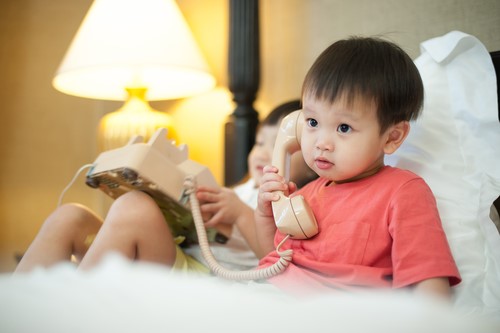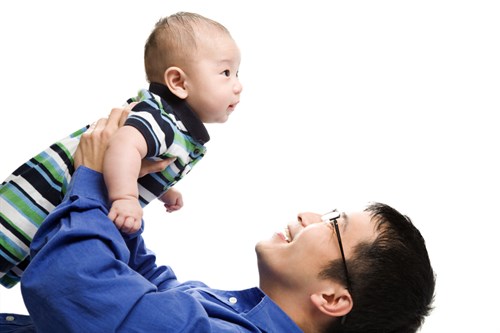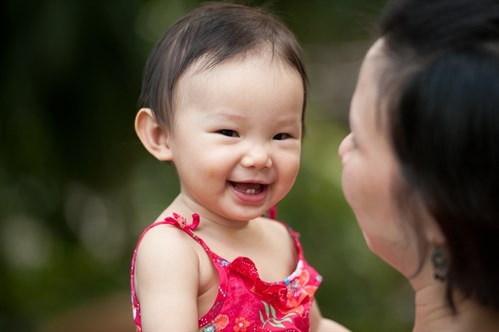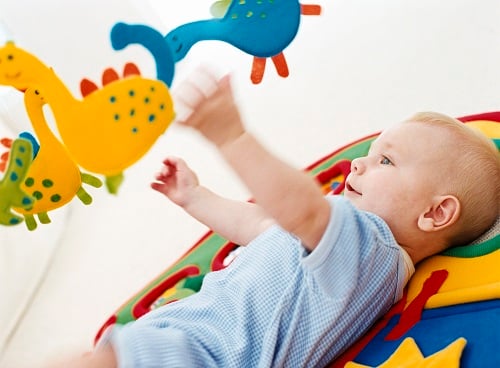The acquisition of language is both a natural and learning process for children and happens as they interact with people and things in their environment. The process is gradual and comes at different paces for every child.
The way you interact with your child will determine how he develops his language skills. According to experts, the first 5 years of your child’s life are the most crucial as this is when the foundation for language development is built.
Language is divided into 2 major aspects:
- Receptive language: The ability to listen and understand language
- Expressive language: The ability to speak and convey messages.
For your child to be a good communicator, he needs to develop well in both these areas.
Stages of Language Development
Birth
Babies are aware of sounds in their environment. They cry if it’s very noisy as they are still unfamiliar with most of the sounds they hear. To express their feelings, they make sounds – this is the infant’s way of communicating.
0-3 Months
Babies start to respond to familiar voices and will listen closely to anything that they are not familiar with. To express delight at seeing their parents or anyone familiar, they usually smile or make a ‘goo-goo’ sound. It is possible to differentiate their cries at this age.
You may think your little baby can’t say much, but it’s still important to communicate with him to help him develop his language skills
4-6 Months
They start to respond to the word “no” and seem to be fascinated at other sounds such as music, the ‘whirr’ of electrical appliances and animal sounds. At this point, a baby should be able to open their throat and make gurgling sounds. They are most likely able to sound out consonants such as m, b and p.
7-12 Months
At this age, babies are often familiar with their names and may look at anyone who calls them. They may start responding to questions and requests. They may also be familiar with names of common household objects and might point at them when asked.
This is usually the time when babies are most likely to say their first word as they are now able to combine vowel and consonant sounds.
However, it’s important for parents to remember that every child is unique and develops at his own pace. Try not to compare your child with other children as this can only cause you undue stress and unnecessary pressure for your child.
Some of you may already be panicking after reading on the various stages of language development. The milestones enumerated above are just general ideas and should not be interpreted too rigidly.
Remember some children can stay in one stage longer than others while some may go through each stage very quickly.
Here are some suggestions to help jump-start your baby’s language development.
There are many things your can do to encourage your baby’s language development
1. Integrate language learning in your baby’s daily activities
As a parent, it is definitely exciting, yet challenging for you to help develop your baby’s language development. Your role is very important as you are your baby’s constant companion. You don’t have to wait for those ‘special moments’ to start helping your baby to develop language. Each moment that you spend with him or her is a ‘teaching moment’.
When your baby “coos”, say something in return. This will help your baby get the idea that the sounds that come out of his or her mouth can catch mummy’s or daddy’s attention.
Studies show that children who were responded to when they made sounds as babies had better cognitive skills when they were older than those who were just ignored.
However, experts say that parents should not respond to every babble as their babies grow older. Mummies and daddies should only respond to sounds that are comprehensible.
This will help the little ones to determine which sounds are effective–making them work harder at repeating them.
2. Interact with your child as often as possible
Find enjoyment in interacting with your baby. According to some studies, babies that are exposed to television, learn 6 words less than their non-TV-viewing counterparts. Parents are advised not to let their babies watch any television at all.
As you do things with him, pretend you’re talking to an adult and explain what you’re doing in detail. You can also read stories or rhymes. Try to make communicating something really fun for your baby.
Interact with your baby as much as possible
3. Talk to your baby the way he wants you to
You may think that baby talk is silly but experts say that this way of talking is actually beneficial for babies. Stretching out the sounds of each syllable actually helps babies become sensitive to individual letter sounds. This makes their auditory facilities more discerning. So start using that sing-song intonation when talking to your baby.
Babies also need to see your lips when you’re talking to them. Before they can understand any word that you’re saying, they first need to learn how to segment, which means they have to see when one word ends and another one begins.
4. Help your baby learn the names of things
Object labelling is an important practice which parents can use to help their child’s language development. Parents can point to an object while saying, “This is ______.”
But this should be done normally with parents just following the lead of their babies. Make sure that your timing is correct so your baby can associate the right label to an object.
While doing object labelling, you can use exaggerated motions to attract your baby’s attention. This practice makes the experience not just auditory but visual as well.
5. Allow your baby to interact with other people
It’s definitely tempting to keep your baby to yourself but experts say that babies learn words easily if spoken by a variety of speakers.
Researchers discovered that a baby will have a hard time learning a new word if only one person is saying it. Even if this certain person keeps on repeating the word, babies will still not get it. But learning a new word will become easy for babies if it’s spoken by many people.
Language development in babies is an exciting and educational journey for all children. If you’re a parent watching your infant grow day by day and enjoying the process tremendously, we hope you find this article beneficial in helping your baby to communicate.
Reference
Stages of Language Development; Bowen, C. (1998); Ages and Stages: Developmental milestones for receptive and expressive language development; Retrieved from http://www.speech-language-therapy.com/devel2.htm on 4-12-09.
The information published herein is intended and strictly only for informational, educational, purposes and the same shall not be misconstrued as medical advice. If you are worried about your own health, or your child’s well being, seek immediate medical advice. You should never delay seeking medical advice, disregard medical advice, or discontinue medical treatment because of information on this website. Kimberly-Clark and/ or its subsidiaries assumes no liability for the interpretation and/or use of the information contained in this article. Further, while due care and caution has been taken to ensure that the content here is free from mistakes or omissions, Kimberly-Clark and/ or its subsidiaries makes no claims, promises or guarantees about the accuracy, completeness or adequacy of the information here, and to the extent permitted by law, Kimberly-Clark and/ or its subsidiaries do not accept any liability or responsibility for claims, errors or omissions.
Last Published* April, 2023
*Please note that the published date may not be the same as the date that the content was created and that information above may have changed since.






